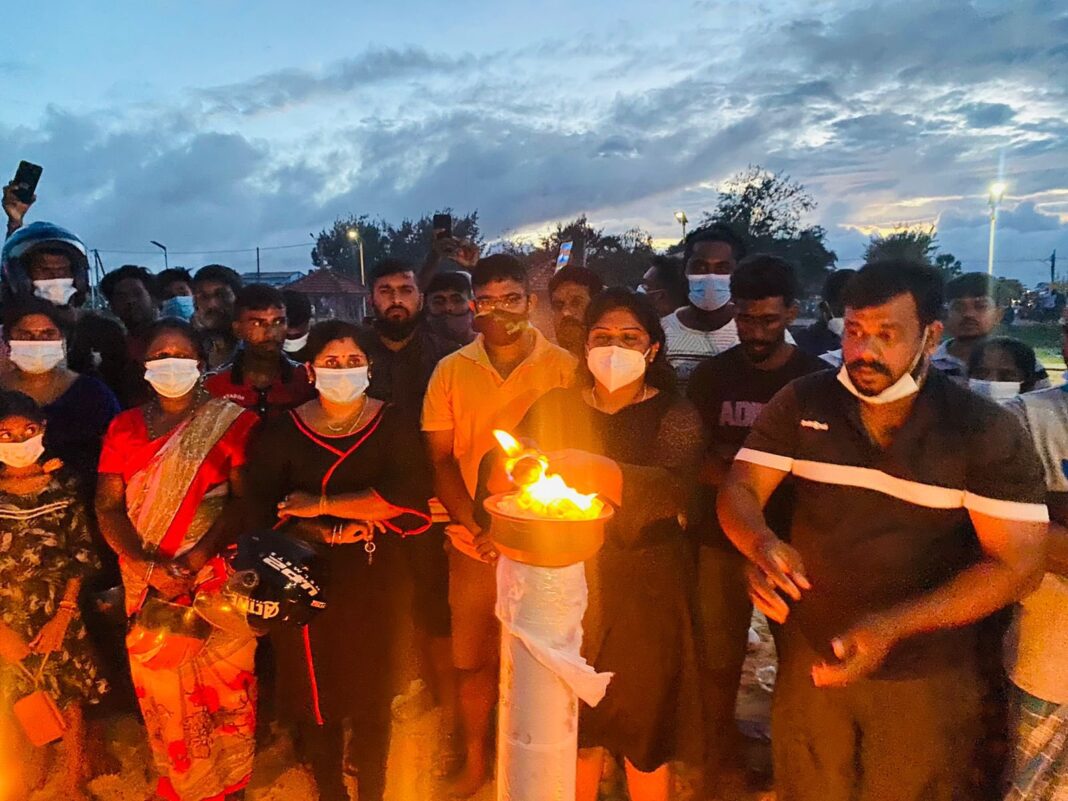November 27th used to mark the culmination of the week-long remembrance of fallen cadres of the Liberation Tigers of Tamil Eelam (LTTE). On that day, cyanide capsules-necked Tiger cadres paraded in the day and the grieving mothers flocked to the cemeteries in the night to light a candle in memory of their dead sons and daughters. Every detail was planned and rehearsed with a near-religious zeal, not least because the ritualistic glorification of martyrdom in these ceremonies was a key driver of indoctrination and
These days should have been an ideal time for solemn recollection and soul searching. Instead, a regular cat and mouse game between the Tamil mourners and security apparatus pervades the day.90 recruitment.
Those days are long gone. The LTTE was decimated. Not just its military project but also its maximalist political project is no longer viable. On November 27, though in declining numbers, Northern Tamils commemorate the Mahaveerar naal (heroes’ day). Many more do so on May 17 to commemorate thousands of civilians who perished when the near three-decade of war came to a brutal end on the shores of Mullaitivu.
These days should have been an ideal time for solemn recollection and soul searching. Instead, a regular cat and mouse game between the Tamil mourners and security apparatus pervades the day. Last weekend was no different. Security forces put up new checkpoints and patrolled on the streets. Black-clad soldiers who were armed to teeth were dispatched to ward off the mourners.
More than a decade since the end of the war, successive governments have failed to fully acknowledge that as much as Colombo celebrates the war victory and pays respect to fallen soldiers, the vanquished also had parents and spouses who have a legitimate right to mourn.
There is an added cruelty when those who are at the receiving end are despondent ageing parents and hapless widows who have suffered through a long and brutal war only to be denied the right to mourn their loved ones in the supposedly peaceful time.
In Valvettithurai, the birthplace of the Tiger supremo Velupillai Prabakaran, security forces prevented around a hundred people from entering a local playground where a commemoration event was planned. A few were later allowed in. In Mullaitivu, police kept away mourners from the Mullivaikkal Beach, the theatre of the final battle.
Most people opted for low key private events. Some civil society groups and political parties that organized public events indeed have personal and political calculations; some of them are the most vocal advocates of the LTTE. Others want to be seen with the crowd due to electoral considerations. None of that was a reason to prevent an ageing 75-year-old mother or a widow from lighting a candle for her lost son or spouse. Sadly, though that keeps happening. Every year come May or November; old wounds are rubbed with salts. Remembering the dead is a fundamental right- no matter on which side they were in the war.
Denial of that basic right, if nothing else is a blight on basic human decency.
There is an added cruelty when those who are at the receiving end are despondent ageing parents and hapless widows who have suffered through a long and brutal war only to be denied the right to mourn their loved ones in the supposedly peaceful time.
This is a recurring tragedy.
More than a decade since the end of the war, successive governments have failed to fully acknowledge that as much as Colombo celebrates the war victory and pays respect to fallen soldiers, the vanquished also had parents and spouses who have a legitimate right to mourn. The failure emanates from skewed political calculations that fostered a post-war triumphalism at the exclusion of others’ feelings.
Then-president Mahinda Rajapaksa nurtured that exclusivist euphoria to expand his dynastic ambitions. Euphoria alone was not enough, hence a large chunk of fear psychosis was exploited. In the absence of suicide bombers of the LTTE, their sick and old mothers were made into an existential threat that surfaces every November 27.
Yahapalanaya albeit its misgivings exercised a more humane approach; public commemorations were allowed, but the display of Tiger insignia and glorification of terrorism was banned. That appeared as if too much of appeasement for some quarters of the current government, which has some of the unabashed racists. Thus, the recourse to the olden days of paranoia.
These days should have been an ideal time for solemn recollection and soul searching. Instead, a regular cat and mouse game between the Tamil mourners and security apparatus pervades the day.
It should not be rocket science to devise a commonsense approach. The denial of remembrance, both in private or public is only adding to an existing set of grievances. Not to mention the public relations disaster. The government should allow the Tamils their right to mourn in public or in private. That poses no threat to national security. Depriving that does.
Yet, there has to be a red line to prevent the ideological bedfellows of the LTTE and opportunistic political actors from exploiting the event to advance their devious ends: any form of Tiger insignia, glorification of martyrdom or any advocacy for taking up of arms, how remote it can be, should be explicitly banned and dealt under the law.
The distinction between mourning the dead and glorification of nihilistic terrorism should be spelt out and acted upon.
In the ideal conditions, hapless parents deserve some form of financial support from the government, for instance, the missing persons commission recommend that Rs. 6,000 per month be paid to the parents of missing Tamil youth. Such generosity, though still nominal compared to the current cost of living, should be extended to others who have lost their immediate family members during the war.
Remembrance of the dead would help, not just personal, but collective healing. Denial would keep festering them
